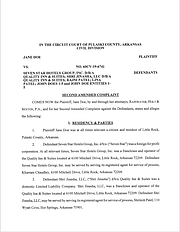Employees of a Little Rock hotel were silent when victims of sex trafficking screamed, ignored women who walked by each day with fresh bruises, and gave traffickers exclusive access to an entire floor of the building, according to a lawsuit filed Friday.
The lawsuit, filed in Pulaski County Circuit Court, is the first in Arkansas to claim civil liability against a hospitality organization over alleged human-trafficking activities. Similar civil lawsuits have been filed in other states but are still relatively new in the U.S.
The first lawsuit in the United States alleging a hotel neglected human-trafficking victims was filed in March in Ohio.
Attorneys Meredith Moore and Lauren Manatt with the Rainwater, Holt & Sexton law firm filed the lawsuit on behalf of an unnamed plaintiff -- Jane Doe -- against Shri Jinasha LLC and Seven Star Hotels Group Inc., former owners of the Quality Inn and Suites at 6100 Mitchell Drive.
[Video not showing up above? Click here to watch » https://www.youtube.com/watch?v=YQn_jGPyizc]
Over the past year and a half, Manatt and Moore have interviewed numerous survivors of human trafficking. Some of the women are plaintiffs in upcoming litigation.
"These are victims of sexual assault, sexual exploitation," Moore said. "These women were forced, held against their will, kidnapped and being forced to perform ... sexual acts with strangers."
A trafficker kept Doe in the hotel from May to July of 2014, the suit contends. She was raped by 10 to 12 people a day on the fourth floor of the building, and the money the customers paid to have sex with Doe was given to the trafficker, according to the lawsuit.
"These women, including minors, were being held against their will. These are not prostitutes," Moore said. "I think that's a huge misconception. People look at human trafficking and there's a stigma about it and that has to change."
[DOCUMENT: Read the full complaint » arkansasonline.com/106suit/]
Between 2007 and 2017, the National Human Trafficking Hotline received 34,700 sex-trafficking reports, according to the Polaris Project, which operates the nationwide hotline.
Doe said in the filing that she was beaten and choked several times a week by her trafficker, and said that she screamed when the trafficker assaulted her. Hotel managers and employees never called 911 to report the screaming, nor did they ever intercede, the suit alleged.
Doe said the fourth floor of the hotel was used exclusively for human trafficking, and that she was among dozens of women -- some of whom were minors -- held captive there.
"That fourth floor was solely being used for the purpose of trafficking," Moore said.
Doe also said that the traffickers entered and exited the hotel through side entrances and were given their own key cards to access the building at any time. The phones on the fourth floor were disconnected, preventing any of the women from calling for help, the suit said.
The traffickers controlled when housekeepers were allowed to clean rooms on the fourth floor, the suit said, and loud music played on the floor all day and all night.
Doe said in the suit that whenever she walked past the front desk, workers, managers and other staff members would put their heads down and looked away, even when she was clearly injured.
Manatt said that even though it is not yet clear whether the hotel management or workers directly profited from the trafficking trade, the hotel certainly benefited from having the fourth floor rented out every day and night for months.
The lawsuit claims the hotel management failed to inspect rooms, to monitor unregistered guests entering and exiting the building, to implement security measures that would preclude the exploitation of minors and adults and failed to properly train employees on the signs of human trafficking.
The filing also alleges that hotel workers and managers never reported to police the signs of mistreatment and endangerment.
Little Rock police officers responded to the Quality Inn and Suites on Mitchell Drive 991 times between 2009 and 2019, according to data provided through a Freedom of Information Act request from the Police Department.
Among the calls were seven prostitution reports, two rapes, a sexual assault and a sexual solicitation report. Police responded to at least 68 reports of drugs and 48 disturbances at or around the hotel and made 69 warrant arrests there. There were no human-trafficking reports in the data.
Police responded to the hotel at least 32 times during the time that the lawsuit said Doe was held captive there.
Moore said that Doe never reported her abuse to police because she was "terrified" of her trafficker.
The hotel has changed hands six times since 2002, according to Pulaski County property records. Shri Jinasha LLC purchased the hotel in 2011 and sold it to Seven Star Hotels Group Inc. in 2015.
The property has since been sold again and is undergoing renovation by the current owner, Aniary LLC.
Aniary purchased the property in March and co-owner Henry Patel said Friday that he was unaware of the hotel's history before purchase. The company is not a defendant in the lawsuit.
"I was not aware this was happening on the fourth floor," Patel said. "I'm really against it. That's all I know."
Patel said he and his partner are working to ensure that all patrons are safe and protected in the hotel, which is now a Best Western.
"If we think they're going to do bad things in our hotel, we'd rather lose that money," Patel said. "We won't have that here. All of my general managers and my clerks are very well trained."
The lawsuit lists four named defendants who held upper management positions during the time Shri Jinasha operated the hotel and five John Doe defendants. Moore said the John Doe defendants could be named during the discovery phase of the litigation.
Both Shri Jinasha and Seven Star Hotels have been dissolved, according to the Arkansas secretary of state's office. Calls and messages to former managers for Shri Jinasha were not returned.
The suit seeks reparations for Doe's physical and mental injuries as well as her medical care, missed earnings and any continuing pain or suffering resulting from the hotel managers' negligence.
Former President Bill Clinton signed the United States' first law to specifically address human trafficking in 2000 with the Trafficking Victims Protection Act. A reauthorization of that act in 2003 established the survivors' right to pursue civil litigation as well as criminal.
By 2013, every state had enacted criminal penalties for human trafficking, though only 34 also have passed civil suit guidelines, according to the National Conference of State Legislatures. Arkansas is one of them.
A 2016 Arkansas law provides trafficking survivors with a pathway to file civil suits against anyone who causes, is responsible for or profits from human trafficking -- including businesses.
Despite federal and local laws, the first civil lawsuit against a hotel only was filed in March in Ohio. The suit alleges several hotels in Ohio neglected to report obvious signs of human trafficking and indirectly profited from the criminal activity.
Similar suits have since been filed in Georgia and Tennessee as well, though none has been fully adjudicated.
Filing the first such suit in Arkansas, Manatt said, comes with its own difficulties.
"Everything is a first trial," Manatt said. "It's good and bad. It's good in that there is no precedent ... but it's also a little scary because we're doing things and we're not exactly sure how it's going to play out."
The Rainwater, Holt & Sexton firm commonly pursues injury cases, such as vehicle accidents, wrongful death and workers' compensation suits. The Jane Doe filing is somewhat out of the norm for the firm, and partner Bob Sexton said both the victim and the attorneys involved are aware that there may be no payout for pursuing the trafficking case.
"What we're hoping for here is societal change," Sexton said.
Sexton said that when hotels are held liable for their neglect, insurance companies will begin requiring measures to prevent human trafficking. Moore said some hotel management companies provide to employees training classes on identifying sex trafficking or put up fliers describing the signs and ways to report human trafficking.
Moore said the social stigma surrounding human and sex trafficking, as well as the fear of abusers and traffickers, can prevent survivors from speaking out about their abuse. In a civil suit, however, Moore said survivors can talk about what happened to them without having to face the person who abused them.
Moore said that many of the women are too afraid of retribution to speak out at all. A number of the women the law firm has interviewed have returned to their abusers and traffickers.
"We've had to gain a lot of trust from women who have been through both physical and mental trauma," Moore said. "They're not after the money, just like we aren't. They're after making the change. I think that's very important. Our clients are just as invested in the cause as, if not more than, we are."
Moore said traffickers often target vulnerable populations, including children and impoverished people. Often, Moore said, the trafficker will get the victim addicted to drugs before or while enslaving them. If a trafficked person escapes the captor or is released, the victim may still face addiction, poverty and the continued effects of the trauma.
Moore and Manatt said that in the years since her abuse, Doe has gotten a job, sought treatment and wants to live a normal life with her child.
"She is one of the most knowledgeable survivors we have talked to," Moore said.
"And one of the most severely abused," Manatt added. "The stories she has told us are the most severe stories we've heard. She is really strong."
Moore, a former deputy prosecuting attorney for Pulaski County, primarily focused on domestic violence, abuse and sexual-assault cases, and said she is well acquainted with the difficulties of pursuing suits like the one filed Friday.
Manatt, however, said she is somewhat new to sexual-violence cases.
"Once you learn about it, it is shocking and appalling," Manatt said. "You want to do anything you can to try to stop it."
Metro on 10/06/2019

